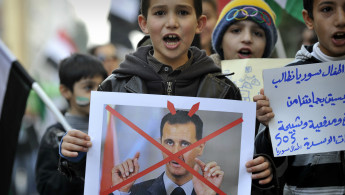Syrian opposition 'congress' excluding figures consenting to Assad survival
The Syrian National Coalition [SNC], the most prominent Syrian political opposition body, has chosen 31 figures to represent it at an upcoming meeting in Riyadh meant to form a delegation for negotiations with the regime, multiple opposition sources have told al-Araby al-Jadeed.
No official date has been announced for the conference, but officials have suggested it would convene in mid-December ahead of a putative 1 January target date for negotiations between Syrian regime representatives and the Syrian opposition.
The Syrian regime has already chosen its representatives, according to UN Syria envoy Staffan de Mistura.
The SNC selected its delegation to Riyadh during a plenary session held Sunday in Istanbul, which discussed a range of issues led by the Vienna peace process and the Riyadh conference.
SNC 'main representative' of Syrian people
"The SNC must be lead any opposition delegation that would negotiate with the Syrian regime," said Haitham al-Maleh, senior SNC official.
Maleh told al-Araby al-Jadeed the SNC is the legitimate representative of the Syrian revolution, citing Arab League and UN resolutions purportedly recognising it as such.
For his part, Hisham Mroueh, vice president of the SNC, told al-Araby al-Jadeed the meeting in Riyadh would be tantamount to a "Syrian opposition congress".
The conference would not only put together a delegation to take part in the Vienna talks, he said, but would also propose a unified vision for Syria's transition and future.
Several political, religious and military figures will be invited to the conference alongside the two main opposition bodies, the SNC and the National Coordination Committee [NCC].
However, it appears that Saudi Arabia will exclude any figure that accepts Bashar al-Assad to remain in power during the transitional period of afterwards, a Saudi government source told SNC figures who spoke to al-Araby al-Jadeed.
UN envoy meets with opposition
On Monday, the UN Syria envoy held a meeting with the political commission of the SNC in Istanbul.
"The meeting tackled the latest developments related to the political process and the negotiations", Mroueh said, pointing out that the SNC asked de Mistura to "focus on the centrality of the Geneva Communique, confidence-building measures and issues like transitional justice and accountability."
The Geneva Communique was a document reached by the major powers calling for a transitional governing body to take over the powers of the Syrian presidence during a transitional period.
Meanwhile, a Syrian rebel source told al-Araby al-Jadeed Mistura would meet with officials from a number of Syrian rebel groups in Istanbul Tuesday, to discuss the political process and ceasefire efforts, as well as to brief them on the outcomes of the latest round of the Vienna talks.
On Sunday, the leader of the SNC Khaled Khoja said he accepted an invitation from Saudi Arabia to attend a meeting in Riyadh meant to "unify visions" regarding upcoming negotiations with the regime.
Khoja also called on the powerful rebel group Nusra Front to break ties with al-Qaeda and re-join the revolution based on a Syrian agenda.
Diplomatic efforts focusing on the Syrian crisis have intensified this week, with multiple meeting taking place between the leaders of key countries concerned with the conflict.
However, the downing of a Russian fighter jet this morning by the Turkish air force over the Turkish-Syrian border could cast a shadow on these efforts, and increase tensions between the countries supporting rival sides in the Syrian war.
Both the Syrian regime and rebels have been making advances against the Islamic State in different parts in Syria.
Syrian rebels are also reportedly carrying out counter-attacks to reverse recent regime gains south of Aleppo, Latakia and the Turkmen Mountain where the Russian jet was shot down Tuesday.





 Follow the Middle East's top stories in English at The New Arab on Google News
Follow the Middle East's top stories in English at The New Arab on Google News
![The UAE is widely suspected of arming the RSF militia [Getty]](/sites/default/files/styles/image_330x185/public/2024-11/GettyImages-472529908.jpg?h=69f2b9d0&itok=Yauw3YTG)
![Netanyahu furiously denounced the ICC [Getty]](/sites/default/files/styles/image_330x185/public/2024-11/GettyImages-2169352575.jpg?h=199d8c1f&itok=-vRiruf5)
![Both Hamas and the Palestinian Authority welcomed the ICC arrest warrants [Getty]](/sites/default/files/styles/image_330x185/public/2024-11/GettyImages-2178351173.jpg?h=199d8c1f&itok=TV858iVg)